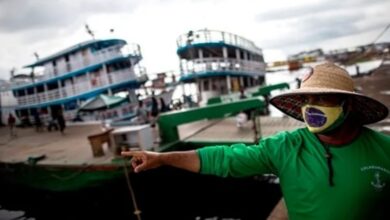Coronavirus: 5 different crises in the same region
The Coronavirus in Latin America has revealed apparent new problems that are leading to internal crises in some countries

The President of Brazil has been harshly criticized for the handling he has given to the pandemic since the first case was known in his country. / Photo: Reuters
LatinAmerican Post | Juliana Suárez
Listen to this article
Leer en español: Coronavirus: 5 crisis distintas en una misma región
In addition to general problems such as unemployment or the looming economic crisis, problems in each government have begun to emerge in the most unequal region in the world, which have been reflected in the management of the crisis caused by the coronavirus.
Bolsonaro's presidency
The health crisis has put Jair Bolsonaro in check, who has been criticized for his handling of COVID-19, which has led to the epicenter of the pandemic to be now in South America. Some experts have stated that Bolsonaro may not be able to finish his presidential term given the government crisis he has been handling.
In addition to the president's constant statements about the coronavirus and against the measures, in recent days a new controversy has been added in relation to the Federal Police. Weeks ago, after the then Minister of Justice and judge who investigated the Lava Jato operation resigned, an investigation was launched against Jair Bolsonaro for allegedly interfering with justice since his children are under investigation.
Also read: Investigation against Bolsonaro begins
In recent days, thanks to the order of a judge of the Federal Supreme Court, a video was published that would be evidence to demonstrate that Bolsonaro has interfered with justice for his own benefit and that of his family. In it, he attacks the intelligence services and the Federal Police (PF). He also stated: " I have already tried to change people from our security in Rio de Janeiro, officially, and I did not succeed! That is over!" This would be proof of Moro's accusations, who resigned after Bolsonaro dismissed the PF director for no apparent reason, for being the one who was conducting the investigation against his children.
New protests
After the protests of the past weeks in Chile, new protests came to Ecuador. After the crisis they had a few months ago due to the number of deaths on the streets, which evidenced that the capacities of their health system had been exceeded, a new crisis hit the country presided over by Lenín Moreno again.
Thousands of people gathered to protest against the economic measures that were announced. Among them, the "salary decrease, elimination of positions in the public sector, reduction of money for universities and closure of state companies" was announced, according to the BBC; all this in response to the pandemic. President Moreno affirmed that the decisions taken may not be accepted by the entire population but were necessary to manage the economic crisis that is ahead.
Health system in danger
In Chile, the increase in cases has made it one of the countries at the epicenter of the pandemic today. For at least 10 days, the exponential increase in cases per day has been a concern in some parts of the country, especially in the capital. Currently, the South American country has more than 90 thousand cases, making it the third country with the most infections in Latin America, just below Brazil and Peru.
According to RT, in the past week, the cases of hospitalization for COVID-19 increased by 47%, which is causing the Chilean health system to reach its limit. In a report from the School of Public Health of the University of Chile, they warned that the Chilean health system would collapse this week, based on the ICU beds that exist and those that are already occupied. The Medical Federation warned that they do not have more capacity and people with serious conditions who need beds continue to arrive. In some hospitals in the capital, they have already had to decide which patients will be able to occupy the last beds, as there is no room for everyone who needs them.
Given this, President Piñera affirmed that "we are very close to the limit, because we have had a very large increase in the needs and demands for medical care, and in beds of intensive care units and respirators. " To counteract the above, the government opened a field hospital in Santiago de Chile.
Two opposing approaches to the same crisis
Nicaragua and El Salvador are two cases of totally opposite handling of the COVID-19 crisis. The first has not decreed any quarantine or social distancing measures and for many days at the beginning of the emergency in Latin America did not go out to give statements. The second, on the contrary, has taken drastic measures from the beginning, even before the first cases were known.
Also read: State of emergency in Salvadoran prisons
Each of these presidents, in their own way, has managed to instill a sense of fear in their citizens.
The government of Daniel Ortega, in Nicaragua, was a participant in a controversy at the beginning of the contingency in the region because its vice president asked the people to take to the streets to march against the virus, which was completely against the indications to avoid its spread. In addition to this, the country never saw a mandatory quarantine.
This week, on May 26, Ortega published what he called the "white paper", where he defends the decisions he has made. This, since it has been criticized by different governments in the region, as well as by organizations such as the Pan American Health Organization (PAHO), the Inter-American Commission on Human Rights, and Human Rights Watch. In that document, the government affirms that it has been based on a strategy of balancing the health impacts and economic impacts.
On the contrary, the President of El Salvador, Nayib Bukele, took drastic measures from the beginning of the contingency. One of its main measures was to close the air borders very early, to prevent imported cases. Their decisions were supported by the fact that El Salvador has a precarious health system and they could not risk its collapse.
Since March, the citizens of El Salvador have been in one of the most restrictive quarantines in the region. What worries many of its citizens, in addition to the impossibility of obtaining a livelihood since the majority of its population lives day to day, is the repression with which the government acts to avoid non-compliance. The presence of armed police and army members on the streets checking that people comply with the drastic quarantine has been a cause of concern for Salvadorans.
Bukele has stated that after June 6 there will be a re-evaluation of whether the mandatory quarantine can begin to relax, but he said that "no matter how many businessmen shout, it is not time to open."




